

Ellen’s Creek Watershed Group

© Ellen’s Creek Watershed Group, 2014
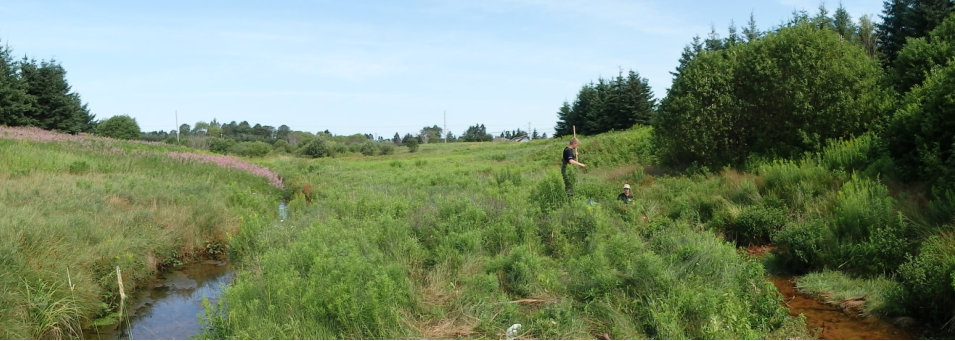

News
2015 - Development of a city-wide Brook Trout Management Plan
In 2015 the City of Charlottetown adopted a “City of Charlottetown Brook Trout Conservation and Protection Plan”. This plan, developed by a steering committee made up of city officials and members of the Ellen’s Creek Watershed Group and the Wright’s Creek Environmental Committee, was guided by noted environmentalist, Ms. Megan Harris. The plan focuses on steps needed to restore and maintain Brook Trout habitat in the Ellen’s, Wright’s and Hermitage creeks. Because a healthy Brook trout population is the central indicator of water course and watershed health all parties agreed this was the place to begin an overall, city-wide watershed plan.February, 2020 Brookie Award Presented to Dr. John Andrew
The “Brookie Award” was created by the Ellen’s Creek
Watershed Group as an award of excellence to an individual,
organization or business demonstrating commitment and
leadership in promoting urban watershed health. The award
is named after the “brookie” (an informal name for brook
trout) in recognition of the correlation between watershed
health and the health of its brook trout population.
Periodically the Brookie is awarded to an
individual or group that has made an outstanding
contribution to the health of city watersheds.
Dr. John W. Andrew co-chairs the Wright’s Creek Watershed Environmental Committee that is responsible for the
health of the Wright’s Creek and Andrew’s Pond. John was instrumental in returning the Creek and the Pond to
environmental health from their moribund state years back. The Andrew family have been stewards of the land and
water in East Royalty for generations. John brings to his community a strong commitment to the health of
individuals, the health of his community, and the health of the environment.
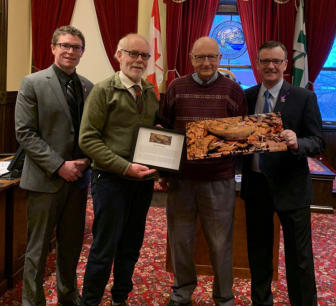
Ecological Health of Ponds in Charlottetown Research Project
During each summer for the past three years, Holland College Environmental Applied Science Technology students and faculty examined the ecological health of eleven (11) ponds within the City of Charlottetown and one (1) reference pond outside the City, in Prince Edward Island (PEI), Canada. The project collected data on surface water quality, sediment chemistry and through macroinvertebrate surveys using the Hilsenhoff’s Family Biotic Index (FBI), delineated the overall ecological health of the ponds sampled. The information collected will help determine the underlying issues responsible for the relatively poor ecological health of some of the ponds surveyed. It will allow the City of Charlottetown and local watershed groups to develop action plans to improve or preserve the ecological health of the ponds studied. 2019 Ecological Health of Ponds in Charlottetown Report 2018 Ecological Health of Ponds in Charlottetown Report 2017 Ecological Health of Ponds in Charlottetown ReportClimate Change
In 2019, the City of Charlottetown joined hundreds of other Canadian municipalities in declaring a Climate Emergency. All over the globe the severe impacts of climate change are being experienced and are quite costly for governments and individuals who are dealing with extreme weather, infrastructure damage, displacement, and adaptation and mitigation efforts. The City of Charlottetown took part in 'Municipalities and Utilities Partnering for Resilience' project led by QUEST (Quality Urban Energy Systems of Tomorrow) in 2019. The first phase of this process involved the collaboration of various stakeholders and City departments in assessing the City of Charlottetown's risk and resilience, specifically when it comes to extreme weather events in the context of climate change. The second phase compiled some key findings and recommendations of how to bolster our climate change resilience moving forward. See the City of Charlottetown’s web page on Climate Change. To see the QUEST report, click here.August, 2020 - A study on The Effects of Weather on Young-of-the-Year Brook Trout
Survivability
In the summer of 2020, Harriet Laver, a 2nd UPEI Coop student, hired by Ellen’s Creek Watershed Group as an Environmental Data Analyst undertook a study to take a look at the effects of weather on the number of the young-of -the-year (YOY) brook trout. Harriet didn't find a correlation between overall temperatures and the number of YOY brook trout but she did find a correlation between the number of freeze/thaw cycles over the winter . Harriet accurately predicted that the YOY results for Ellen's Creeks annual electrofishing survey would be up based on the correlation she made. It is significant because climate change is expected to result in more freeze thaw cycles and less snow.
June, 2022 Meet our New Watershed Coordinator - Emma Doucette
Emma is a graduate of the Environmental Applied Science
& Technology program at Holland College and is entering
her fourth year of study in the Bachelor of Environmental
Studies program, specializing in Island Environments &
Sustainability, at the University of Prince Edward Island.
Working on the 2020 and 2021 Charlottetown Ecological
Pond Studies fostered Emma’s enthusiasm for water
quality and urban watershed management. Her other
interests include mountain biking, skiing, and enjoying
Prince Edward Island’s beautiful beaches.
Emma is looking forward to contributing to the excellent
work that has already been carried out by the Ellen’s
Creek Watershed Group and becoming more involved with
the Prince Edward Island watershed community.
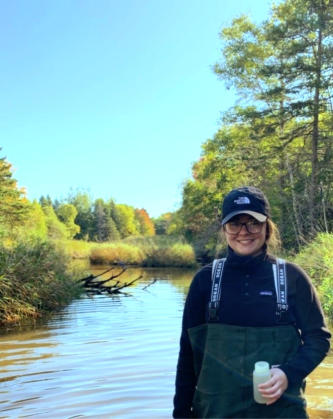
June to November, 2022 - Activities of the ECWG


Ellen’s Creek Watershed Group

© Ellen’s Creek Watershed Group Inc. 2014

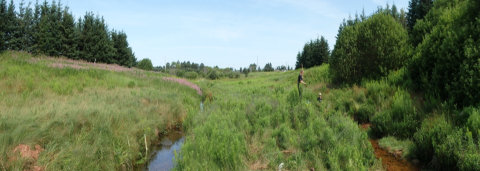
Ecological Health of Ponds in Charlottetown Research
Project
For each of the past three years Ellen’s Creek Watershed Group provided logistical support for a collaborative research project with the Holland College Environmental Science Technology (EAST) Program that looked at the ecological health of 12 ponds in Charlottetown. See the Reports: 2019 Ecological Health of Charlottetown Ponds 2018 Ecological Health of Charlottetown Ponds 2017 Ecological Health of Charlottetown Ponds```````````````````````````````
News
May, 2020 - See our 2019-20 Final Report to the
Watershed Management Fund
```````````````````````````````
2015 - Development of a city-wide Brook Trout
Management Plan
In 2015 the City of Charlottetown adopted a “City of Charlottetown Brook Trout Conservation and Protection Plan”. This plan, developed by a steering committee made up of city officials and members of the Ellen’s Creek Watershed Group and the Wright’s Creek Environmental Committee, was guided by noted environmentalist, Ms. Megan Harris. The plan focuses on steps needed to restore and maintain Brook Trout habitat in the Ellen’s, Wright’s and Hermitage creeks. Because a healthy Brook trout population is the central indicator of water course and watershed health all parties agreed this was the place to begin an overall, city-wide watershed plan.
February, 2020 Brookie Award Presented
to Dr. John Andrew
The “Brookie Award” was created by the Ellen’s Creek
Watershed Group as an award of excellence to an
individual,
organization or business demonstrating commitment and
leadership in promoting urban watershed health. The
award
is named after the “brookie” (an informal name for brook
trout) in recognition of the correlation between
watershed health and the health of its brook trout
population. Periodically the Brookie is awarded to an
individual or group that has made an outstanding
contribution to the health of city watersheds.
Dr. John W. Andrew co-chairs the Wright’s Creek
Watershed Environmental Committee that is responsible
for the health of the Wright’s Creek and Andrew’s Pond.
John was instrumental in returning the Creek and the Pond
to environmental health from their moribund state years
back. The Andrew family have been stewards of the land
and water in East Royalty for generations. John brings to
his community a strong commitment to the health of
individuals, the health of his community, and the health of
the environment.
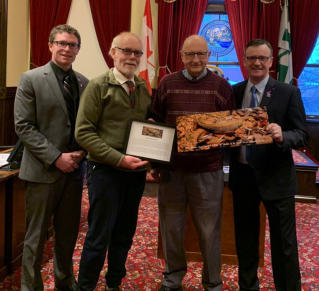
August, 2020 - A study on The Effects of
Weather on Young-of-the-Year Brook Trout
Survivability
In the summer of 2020, Harriet Laver, a 2nd UPEI Coop student, hired by Ellen’s Creek Watershed Group as an Environmental Data Analyst undertook a study to take a look at the effects of weather on the number of the young-of - the-year (YOY) brook trout. Harriet didn't find a correlation between overall temperatures and the number of YOY brook trout but she did find a correlation between the number of freeze/thaw cycles over the winter . Harriet accurately predicted that the YOY results for Ellen's Creeks annual electrofishing survey would be up based on the correlation she made. It is significant because climate change is expected to result in more freeze thaw cycles and less snow.
Meet our new Watershed Coordinator -
Emma Doucette
Emma is a graduate of the
Environmental Applied
Science & Technology
program at Holland College
and is entering her fourth
year of study in the
Bachelor of Environmental
Studies program,
specializing in Island
Environments &
Sustainability, at the
University of Prince Edward
Island.
Working on the 2020 and 2021 Charlottetown Ecological Pond
Studies fostered Emma’s enthusiasm for water quality and
urban watershed management. Her other interests include
mountain biking, skiing, and enjoying Prince Edward Island’s
beautiful beaches.
Emma is looking forward to contributing to the excellent work
that has already been carried out by the Ellen’s Creek
Watershed Group and becoming more involved with the Prince
Edward Island watershed community.



























